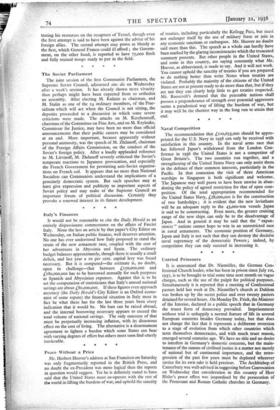The Soviet Parliament The joint session of the first Communist
Parliament, the Supreme Soviet Council, adjourned sine die on Wednesday after a week's session. It has already shown mare vivacity than perhaps might have been expected from so orthodox an assembly. After electing M. Kalinin as chairman, and M. Stalin as one of the 24 ordinary members, of the Prae- sidium which will act when the Council is not sitting, the deputies proceeded to a discussion in which some severe criticisms were made. The attacks on M. Kerzhentseff, chairman of the Committee on Fine Arts, and on M. Krylenko, Commissar for Justice, may have been no more than official announcements that their public careers may be considered at an end. More important, because apparently without personal animosity, was the speech of M. Zhdanoff, chairman of the Foreign Affairs Commission, on the conduct of the Soviet's foreign policy. After a loudly applauded reference to M. Litvinoff, M. Zhdanoff severely criticised the Soviet's temperate reactions to Japanese provocation, and especially the French Government for permitting anti-Soviet organisa- tions on French soil. It appears that no more than National Socialists can Communists understand the implications of a genuinely democratic system. But such speeches may at least give expression and publicity to important aspects of Soviet policy and may make of the Supreme Council an important forum of political discussion. Certainly they provoke a renewed interest in its future development.














































 Previous page
Previous page